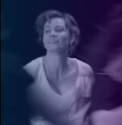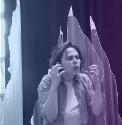Space for the community!

Space for the community!
Zana Hoxha Krasniqi
This year within our program of feminist philanthropy and our edition “They inspire and motivate us” we continue to share with you the voices and experiences of women inspiring us. We present to you Zana Hoxha Krasniqi, the founder and director of the group Artpolis from Kosovo. Artpolis promotes culture, art, multi ethnicity; it uses theater as a tool to promote diversity. She started “Femmes Fatales” festival in Prishtina. The festival promotes, empowers and celebrates women who through art share their ideas, experience and work.
Why is it important to organize feminist festivals and gatherings?
I think it’s important because it creates this safe and creative space not only for artists but also for the community. It is a great and unique opportunity to break the barriers of what feminist is concepted by the community – because the majority of our community not only in Kosovo but also in the region, and I would freely say in the world, thinks that the concept of feminism is to hate men.
Well, with feminist festivals we break this, we reconfirm that feminism is a constant struggle and fight for human rights, because women are human, and women’s rights are guaranteed by all the declarations and we have to break this patriarchal way of living which is embodied in our minds and our souls from when we know how to talk and from the way that we are raised – from Do this and that, This is allowed and this is not allowed… so I think that festivals break these barriers and they do that through the work of artists, women and men who have feminist approach and who do this for the community.
For me, a feminist festival is important not only for the artists and activists gathered there – for me it is important because of the community that reaches to that festival – and that’s exactly what we try to do with FemArt, to offer this space for the community, to offer this space for young and older generations, women, men, boys and girls, LGBT community, the unheard community such as the minorities in Kosovo, like Serbians or Roma people, or Turkish or Gorani – also including people with disabilities, to offer the space for them to feel that we are all equal and that diversity that surrounds us should be cherished and should be promoted, and not to mention that the diversity is something that is bad. So I think that this is what the feminist festivals are creating.
Do you think it’s important to invest money in women’s human rights? To invest into art?
Of course, definitely. Under the current circumstances, unfortunately, the women’s rights – I wouldn`t say just women’s rights but human rights – are in the mouth of every donor but if they want to support something about women, they say it’s for the gender equality. And I think that this politics of the donors for gender equality is the wrong path. Why I believe this? Because we can not achieve equality without empowering women first – so that when they sit at the same table with men, and if there are 5 women and 5 men, we have to empower these 5 women enough to be able to discuss equally with men, because if we just put 5 women and 5 men in one space and we say “This is gender equality”, I don`t think it would be true. So I think we should invest not only money, but also our capacities, our solidarity, our love in working with women, younger generations, older generations, women who have had no chance before, so that they come to this point to say “I am empowered, I am not afraid to sit in front of men and to express my own opinion and to fight for my own opinion and my right”.
Do you think it’s important to have feminist foundations and do you know about them?
Yes, I know about the Kosovo Women’s Network, they have the Kosovo women’s fund. I know about Reconstruction Women’s Fund, I know about Mama Cash, Global Fund for Women, for Kvinna Till Kvinna… So all these feminist women’s foundations have helped us survive in a way and also to be able to develop ourselves and our capacities. Without the feminist foundations, I don`t think that we would be able to find our own voice, because whereas other donors consider that their strategy, their own agenda is important to be implemented by the civil society organizations, the feminist foundations are there to help you discover and also implement your own agenda – what is important for your own community, not something that was made up somewhere in Brussels, New York or somewhere.
So I think this is what makes it important to have them and I am especially happy now that we have local foundations like Reconstruction Women’s Fund or Kosovo Women’s Network fund. So I think these are important ways of recognizing the needs of women, not only on grassroots level but also other needs, and that, I will just take an example: when we did this year’s FemArt, I didn’t think to apply to the women’s fund because I thought this is for grassroots organizations and my organization, although we work all the time with the community, is not grassroots anymore, we have reached another kind of sustainability, which is not grassroots anymore. We have a grassroots approach. So, I didn’t think I could apply there, you know? And then they called me and they asked if I was planning to apply, because they had this approach to call all the organizations and speak with organizations that are part of the Kosovo Women’s Network. I said: I don`t know, I didn’t plan it. But what you do is important, your work is important, so you should think about it. And then we thought about it and yes, we recognized that through our performances, our exhibitions, panels, workshops, we are contributing. And it is very important that you have this foundation, that you see it as a shelter, I must say, and that there is somebody to listen to your needs and your concerns and what you want to do and is there to support you, of course, within their strategy but without their own little agendas, which are usually there for the other donors.
What does the concept of solidarity mean to you?
For me, the concept of solidarity is constantly… it’s a very fluid thing, but I have learned here at Transit that you can never take love, you can only give. So for me the concept of solidarity is giving my love, my support, my help, my knowledge, sharing it with others, without worrying whether I am going to take it. Because I know that the universe, the way it… I give to someone and someone else will give to me. And when it comes to solidarity among women specifically, I think it is a priority. We should have it as a priority, even when we don`t agree with certain people although they are women, even when we don`t believe, if they need our support, if somebody needs my help, I should be beyond my ego and show my solidarity. This is hard, it is not easy, I must say, and also solidarity for me is being able to love yourself and to let go of your fears, because we sometimes see solidarity only as towards others, but we forget that we should first have solidarity with ourselves, with our mistakes, our faults, self-hatred, so I think that this is something that we should open up more and talk about more.
Ok, thanks a lot.
Thank you.
To see and share interviews go to http://www.rwfund.org/eng/2016/11/01/interview-zana-hoxha-krasniqi-space-for-the-community/





